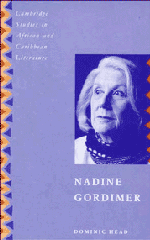Book contents
- Frontmatter
- Contents
- Preface
- List of abbreviations
- Chronology
- 1 Gordimer and South Africa: themes, issues and literary identity
- 2 The early novels: The Lying Days, A World of Strangers and Occasion for Loving
- 3 Developing narrative muscle: The Late Bourgeois World, A Guest of Honour and The Conservationist
- 4 The construction of identity: Burger's Daughter and July's People
- 5 Self-reflexive reassessments: A Sport of Nature and My Son's Story
- 6 The short stories
- 7 Conclusion. Gordimer: postmodernist?
- Notes
- Select bibliography
- Index
7 - Conclusion. Gordimer: postmodernist?
Published online by Cambridge University Press: 05 July 2011
- Frontmatter
- Contents
- Preface
- List of abbreviations
- Chronology
- 1 Gordimer and South Africa: themes, issues and literary identity
- 2 The early novels: The Lying Days, A World of Strangers and Occasion for Loving
- 3 Developing narrative muscle: The Late Bourgeois World, A Guest of Honour and The Conservationist
- 4 The construction of identity: Burger's Daughter and July's People
- 5 Self-reflexive reassessments: A Sport of Nature and My Son's Story
- 6 The short stories
- 7 Conclusion. Gordimer: postmodernist?
- Notes
- Select bibliography
- Index
Summary
The interpretations of Gordimer's work I have offered indicate strong connections with contemporary intellectual trends. I have characterized her fiction as containing a working-through of her own micropolitics, and an associated articulation of geopolitical concerns. The novel sequence betrays a development and refinement of central themes, and the early work is very significant in this development: even in the first three novels Gordimer conducts a critical examination of European literary forms, evincing a concern to fashion a cultural identity and expression appropriate to the goal of political change in South Africa. A phase then ensues in which the politics of textuality assumes central significance: the novels up to The Conservationist express with an increasing urgency a conviction about the importance of discursive practices as the sites of power, and here the concern with micropolitics and geopolitics is closely allied with the construction of narrative form. This becomes more explicit in Burger's Daughter where Gordimer fashions a novelistic form which, through its problematized narrative perspective, reinforces her implications about the ideological function of discourse. There is, then, an increasing literary self-consciousness in Gordimer's work which reaches a peak in the self-reflexiveness of My Son's Story, and (especially) A Sport of Mature.
This characterization of Gordimer's career – in which the logic of the early novels produces an increasingly explicit literariness in the later ones – is an account which suggests affinities between Gordimer's work and important postmodernist trends, where one finds a stress on textual construction as one of several areas of crossover with poststructuralist thought.
- Type
- Chapter
- Information
- Nadine Gordimer , pp. 182 - 193Publisher: Cambridge University PressPrint publication year: 1994



